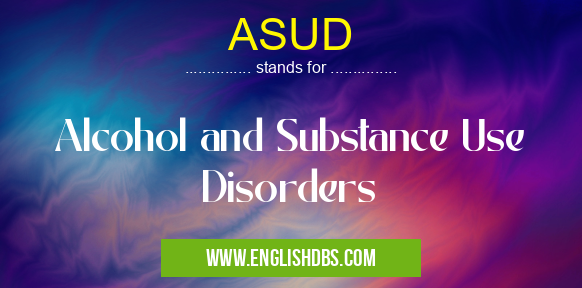What does ASUD mean in UNCLASSIFIED
ASUD stands for Alcohol and Substance Use Disorders. It is a term used to describe a range of conditions characterized by the compulsive use of alcohol or other substances, despite negative consequences. These disorders can lead to significant health, social, and economic problems.

ASUD meaning in Unclassified in Miscellaneous
ASUD mostly used in an acronym Unclassified in Category Miscellaneous that means Alcohol and Substance Use Disorders
Shorthand: ASUD,
Full Form: Alcohol and Substance Use Disorders
For more information of "Alcohol and Substance Use Disorders", see the section below.
What is ASUD?
ASUDs are classified as mental disorders by the American Psychiatric Association in their Diagnostic and Statistical Manual of Mental Disorders (DSM-5). They are characterized by a pattern of substance use that causes clinically significant impairment or distress.
Symptoms of ASUD
Symptoms of ASUD can vary depending on the substance being used, but may include:
- Cravings for the substance
- Compulsive use despite negative consequences
- Tolerance, requiring increasing amounts of the substance to achieve the same effect
- Withdrawal symptoms upon cessation or reduction of use
Causes of ASUD
The exact causes of ASUD are not fully understood, but a combination of biological, psychological, and social factors is thought to contribute to their development. These factors may include:
- Genetic predisposition
- Mental health conditions such as depression or anxiety
- Trauma or abuse
- Environmental factors such as peer pressure or easy access to substances
Treatment for ASUD
Treatment for ASUD typically involves a combination of therapies, including:
- Counseling to address underlying psychological issues
- Medications to reduce cravings and withdrawal symptoms
- Support groups to provide a supportive environment for recovery
Essential Questions and Answers on Alcohol and Substance Use Disorders in "MISCELLANEOUS»UNFILED"
What are Alcohol and Substance Use Disorders (ASUDs)?
ASUDs are chronic, relapsing brain diseases that involve the compulsive use of alcohol or drugs despite negative consequences. They are characterized by impaired control over use, cravings, and continued use despite harm.
What are the symptoms of ASUDs?
Symptoms of ASUDs include:
- Inability to limit use
- Increased tolerance or needing more to achieve the same effect
- Withdrawal symptoms when use is stopped or reduced
- Persistent desire or cravings to use
- Spending excessive time using or recovering from use
- Using despite physical, mental, or social problems caused by use
What are the risk factors for developing ASUDs?
Risk factors for ASUDs include:
- Family history of substance use disorders
- Personal history of trauma or abuse
- Mental health conditions such as depression or anxiety
- Peer pressure or social environment that encourages use
- Easy access to substances
How are ASUDs diagnosed?
ASUDs are diagnosed by a healthcare professional based on a comprehensive assessment that includes:
- Physical and mental health examination
- Substance use history
- Interview with the individual and family members
- Use of diagnostic criteria from the Diagnostic and Statistical Manual of Mental Disorders (DSM-5)
What are the treatment options for ASUDs?
Treatment for ASUDs typically involves a combination of approaches, including:
- Medication to reduce cravings and withdrawal symptoms
- Behavioral therapy to develop coping mechanisms and relapse prevention skills
- Support groups and recovery programs to provide peer support and accountability
- Long-term follow-up and monitoring to prevent relapse
How can I help someone with an ASUD?
To help someone with an ASUD:
- Offer support and encouragement
- Guide them towards professional help
- Be patient and understanding
- Avoid judgment or confrontation
- Encourage them to join support groups or recovery programs
Final Words: ASUDs are serious mental disorders that can have a devastating impact on individuals, families, and communities. However, effective treatments are available, and recovery is possible. If you or someone you know is struggling with an ASUD, it is important to seek professional help.
